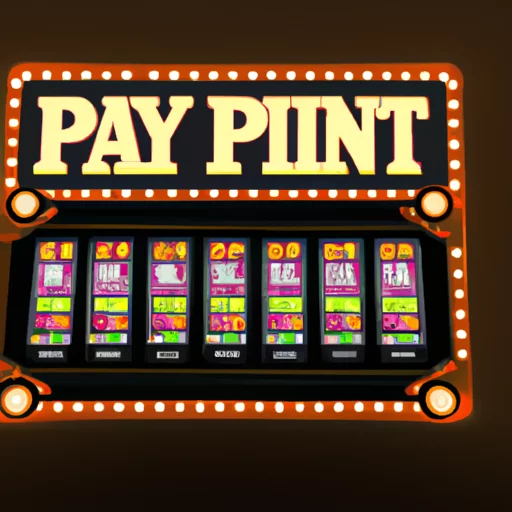 The Pay By Phone Bill Casino & Pay Using Phone Credit Slots with Slotmatic Betting, Newest Slot Sites posts with CasinoPhoneBill.com
The Pay By Phone Bill Casino & Pay Using Phone Credit Slots with Slotmatic Betting, Newest Slot Sites posts with CasinoPhoneBill.com
History Of Bookmaking UK| Mobiel Slot
-
Casino Phone Bill Articles
- Introduction
- The History of Bookmaking in the UK: How It All Began
- The Evolution of Bookmaking in the UK: From Traditional to Online Betting
- The Impact of Mobile Slot Machines on the UK Bookmaking Industry
- Exploring the Different Types of Bookmakers in the UK
- A Look at the Regulations Surrounding Bookmaking in the UK
- How Technology Has Changed the Way We Bet in the UK
- The Benefits of Betting with a Mobile Slot Machine
- Understanding the Different Odds Formats Used by UK Bookmakers
- Exploring the Different Types of Bets Available Through UK Bookmakers
- A Look at the Different Bonuses and Promotions Offered by UK Bookmakers
- How to Choose a Reputable and Secure UK Bookmaker
- The Future of Bookmaking in the UK: What Can We Expect?
- Q&A
- Conclusion
“Experience the Rich History of Bookmaking UK with Mobiel Slot!”
Introduction
The history of bookmaking in the UK is a long and fascinating one. From the earliest days of betting on horse races to the modern day mobile slot machines, bookmaking has been an integral part of British culture for centuries. This article will explore the history of bookmaking in the UK, from its origins to its current state. We will look at how bookmakers have adapted to changing times and technology, and how they have helped shape the gambling industry in the UK. We will also discuss the impact of mobile slot machines on the industry, and how they have revolutionised the way people bet. Finally, we will look at some of the key figures in the history of bookmaking in the UK, and how their influence has shaped the industry today.
The History of Bookmaking in the UK: How It All Began
Bookmaking in the UK has a long and storied history, stretching back centuries. It is believed to have originated in the 17th century, when the first bookmakers began taking bets on horse races.
At this time, bookmakers were known as “oddsmakers” and they would set the odds for each race. This was done by taking into account the form of the horses, the jockeys, and other factors. The odds were then written down in a book, hence the name “bookmaker”.
The first official bookmaker in the UK was established in 1798 by William Hill. He opened a shop in London and began taking bets on horse races. He quickly gained a reputation for being reliable and trustworthy, and his business flourished.
In 1853, the Betting and Gaming Act was passed, which allowed bookmakers to operate legally in the UK. This led to a boom in bookmaking, with many new shops opening up across the country.
By the early 20th century, bookmaking had become an established part of British culture. It was seen as a legitimate way to make money and many people made a living from it.
Today, bookmaking is still popular in the UK and there are hundreds of licensed bookmakers operating across the country. They offer a wide range of betting options on sports, horse racing, and other events. Bookmakers also offer online betting services, allowing customers to place bets from anywhere in the world.
Bookmaking has come a long way since its humble beginnings in the 17th century. It has become an integral part of British culture and continues to be popular today.
The Evolution of Bookmaking in the UK: From Traditional to Online Betting
Bookmaking has been a part of the British culture for centuries, and its evolution has been a fascinating journey. From the traditional methods of taking bets on horse racing and other sports to the modern online betting platforms, bookmaking in the UK has come a long way.
In the early days, bookmakers were known as “turf accountants” and they operated mainly at racecourses. They would take bets from punters and then pay out winnings if the bet was successful. This was a risky business as there was no guarantee that the punter would pay up if they lost.
The first major change to bookmaking in the UK came in 1961 when the Betting and Gaming Act was passed. This allowed bookmakers to open shops on the high street, which meant that punters could place bets without having to go to the racecourse. This was a huge step forward for bookmaking in the UK and it allowed more people to get involved in betting.
The next major change came in the late 1990s when online betting began to take off. This allowed punters to place bets from anywhere in the world, as long as they had an internet connection. This revolutionised bookmaking in the UK and made it much easier for people to place bets.
Today, online betting is the most popular form of bookmaking in the UK. There are hundreds of different websites offering different types of bets, from sports betting to Casino games. Punters can also take advantage of bonuses and promotions offered by these sites, which makes it even more attractive.
Bookmaking in the UK has come a long way since its traditional roots, and it is now easier than ever for punters to place bets on their favourite sports or games. With so many different options available, it is no wonder that online betting is so popular in the UK today.
The Impact of Mobile Slot Machines on the UK Bookmaking Industry
The UK bookmaking industry has been revolutionised by the introduction of mobile slot machines. This new technology has enabled punters to access their favourite games from anywhere, at any time.
The impact of mobile slot machines on the UK bookmaking industry has been significant. For starters, it has allowed bookmakers to expand their customer base and reach a wider audience. This is because mobile slot machines are more accessible than traditional land-based slots, as they can be played on any device with an internet connection.
Furthermore, mobile slot machines have enabled bookmakers to offer more attractive bonuses and promotions. This has helped to attract more customers and increase their profits.
In addition, mobile slot machines have allowed bookmakers to offer a more personalised experience to their customers. This is because they can tailor the games to suit individual preferences and provide a more immersive experience.
Finally, mobile slot machines have enabled bookmakers to reduce their costs. This is because they no longer need to maintain physical premises or employ staff to manage them. Instead, they can simply manage their operations online, which is much cheaper and more efficient.
Overall, it is clear that the introduction of mobile slot machines has had a major impact on the UK bookmaking industry. It has allowed bookmakers to expand their customer base, offer more attractive bonuses and promotions, provide a more personalised experience, and reduce their costs. As such, it is likely that this technology will continue to shape the industry in the years to come.
Exploring the Different Types of Bookmakers in the UK
The UK is home to a wide variety of bookmakers, each offering different services and betting options. From traditional high street bookmakers to online-only operators, there is something for everyone. In this article, we will explore the different types of bookmakers available in the UK and what they offer.
High Street Bookmakers: High street bookmakers are the traditional brick-and-mortar betting shops that have been around for decades. These shops offer a wide range of betting options, including sports betting, horse racing, and more. They also offer in-shop gaming machines such as slot machines and roulette.
Online Bookmakers: Online bookmakers are becoming increasingly popular in the UK. These operators offer a wide range of betting options, including sports betting, horse racing, and more. They also offer bonuses and promotions to attract new customers.
Exchange Betting: Exchange betting is a type of online betting where customers can bet against each other rather than against the bookmaker. This type of betting is becoming increasingly popular in the UK as it offers more flexibility and better odds than traditional bookmakers.
Spread Betting: Spread betting is a type of financial betting where customers bet on the price movement of an asset or index. This type of betting is popular with experienced traders who are looking to make bigger profits from their investments.
In-Play Betting: In-play betting is a type of online betting where customers can place bets on events while they are taking place. This type of betting is becoming increasingly popular in the UK as it allows customers to react quickly to changing events and take advantage of opportunities as they arise.
These are just some of the different types of bookmakers available in the UK. Each offers different services and betting options, so it's important to do your research before choosing one that best suits your needs.
A Look at the Regulations Surrounding Bookmaking in the UK
Bookmaking is a popular pastime in the UK, with millions of people placing bets on sports and other events each year. However, the activity is heavily regulated by the UK Gambling Commission, which sets out strict rules and regulations for bookmakers to follow.
The Gambling Commission requires all bookmakers to be licensed and to adhere to a code of practice. This includes ensuring that customers are treated fairly, that they are not exposed to excessive levels of risk, and that they are not encouraged to gamble more than they can afford. Bookmakers must also ensure that their websites and other services are secure and that customers' personal data is kept safe.
Bookmakers must also comply with advertising regulations. They must not target vulnerable people or those under the age of 18, and must not make false or misleading claims about their services. They must also ensure that any advertising they do is socially responsible and does not encourage excessive gambling.
Bookmakers must also take steps to prevent money laundering and fraud. They must carry out due diligence checks on customers, including verifying their identity, and must report any suspicious activity to the relevant authorities.
Finally, bookmakers must pay taxes on their profits. This includes paying a 15% tax on gross profits from betting activities, as well as any other taxes that may be applicable in their jurisdiction.
Overall, the UK Gambling Commission has put in place a comprehensive set of regulations to ensure that bookmaking is conducted responsibly and in a way that protects customers from harm. By following these regulations, bookmakers can ensure that they remain compliant with the law and can continue to offer their services safely and securely.
How Technology Has Changed the Way We Bet in the UK
The UK betting industry has seen a dramatic shift in recent years, as technology has revolutionised the way we bet. From the days of placing bets in person at a bookmaker's shop, to the modern era of online betting, technology has had a huge impact on the way we gamble.
The most obvious change has been the introduction of online betting. This has allowed punters to place bets from the comfort of their own home, or even on the go via their mobile device. Online betting sites offer a huge range of markets and competitive odds, making it easier than ever to find the best value bets.
In addition to online betting, technology has also changed the way we bet in other ways. For example, live streaming of sports events has become increasingly popular, allowing punters to watch events as they happen and place bets in real time. This has made it easier for punters to make informed decisions about their bets and take advantage of in-play markets.
Technology has also changed the way we bet through the introduction of automated betting systems. These systems use algorithms to analyse data and make predictions about upcoming events, allowing punters to place bets with greater accuracy and confidence.
Finally, technology has also changed the way we bet through the introduction of virtual sports betting. This allows punters to bet on simulated sports events, such as virtual football or horse racing, which are generated by computer algorithms. This has opened up a whole new world of betting opportunities for punters.
Overall, it is clear that technology has had a huge impact on the way we bet in the UK. From online betting to automated systems and virtual sports betting, technology has revolutionised the industry and made it easier than ever for punters to find value and make informed decisions about their bets.
The Benefits of Betting with a Mobile Slot Machine
Mobile slot machines have become increasingly popular in recent years, as more and more people are turning to their phones and tablets to play their favorite casino games. Mobile slot machines offer a number of benefits that make them an attractive option for players.
First, mobile slot machines are incredibly convenient. Players can access their favorite games from anywhere, at any time. This means that players can play their favorite slots while on the go, whether they're waiting in line at the grocery store or taking a break from work. Mobile slot machines also allow players to play for longer periods of time, as they don't have to worry about finding a place to sit down and play.
Second, mobile slot machines offer a wide variety of games. Players can choose from classic slots, video slots, progressive slots, and more. This means that players can find the perfect game for their tastes and preferences. Additionally, many mobile slot machines offer bonus features such as free spins and bonus rounds that can increase the chances of winning big jackpots.
Finally, mobile slot machines are incredibly secure. Most mobile casinos use the latest encryption technology to ensure that all transactions are safe and secure. This means that players can rest assured that their personal information is safe when playing on a mobile slot machine.
Overall, mobile slot machines offer a number of benefits that make them an attractive option for players. They are incredibly convenient, offer a wide variety of games, and are incredibly secure. For these reasons, more and more people are turning to their phones and tablets to play their favorite casino games.
Understanding the Different Odds Formats Used by UK Bookmakers
Bookmakers in the UK use a variety of odds formats to display the potential returns of a bet. Understanding these formats is essential for any punter looking to make an informed decision when placing a wager.
The most common format used by UK bookmakers is fractional odds. This format displays the potential return of a bet as a fraction, with the numerator representing the amount that will be won and the denominator representing the stake. For example, if a bet has odds of 5/2, this means that for every £2 staked, the punter will receive £5 in return if their bet is successful.
Decimal odds are also popular in the UK. This format displays the potential return of a bet as a single number, with the figure representing the total amount that will be won if the bet is successful. For example, if a bet has odds of 3.50, this means that for every £1 staked, the punter will receive £3.50 in return if their bet is successful.
Finally, American odds are sometimes used by UK bookmakers. This format displays the potential return of a bet as two numbers separated by a slash. The first number represents how much must be staked to win £100, while the second number represents how much will be won if £100 is staked. For example, if a bet has odds of +150/-200, this means that for every £200 staked, the punter will receive £150 in return if their bet is successful.
By understanding these different formats, punters can make more informed decisions when placing bets with UK bookmakers.
Exploring the Different Types of Bets Available Through UK Bookmakers
UK bookmakers offer a wide range of betting options for punters, from traditional fixed-odds betting to more complex wagers. This article will explore the different types of bets available through UK bookmakers, outlining the advantages and disadvantages of each.
Fixed-Odds Betting: Fixed-odds betting is the most common type of bet offered by UK bookmakers. This type of bet involves predicting the outcome of an event and placing a wager on it at a set price. The odds are fixed, meaning that the payout is predetermined regardless of the outcome. This type of bet is simple and straightforward, making it popular among novice punters. However, it can be difficult to make a profit with fixed-odds betting due to the low odds offered by bookmakers.
Spread Betting: Spread betting is a more complex form of betting than fixed-odds betting. It involves predicting the outcome of an event within a range of outcomes, rather than a single result. The payout is determined by how close the prediction is to the actual result. Spread betting can be more profitable than fixed-odds betting, as it offers higher potential payouts. However, it also carries greater risk due to its complexity and the potential for large losses if the prediction is incorrect.
Accumulator Bets: Accumulator bets involve placing multiple wagers on different events and combining them into one bet. If all of the predictions are correct, then the punter will receive a larger payout than if they had placed each bet separately. Accumulator bets can be profitable, but they also carry greater risk due to the need to correctly predict multiple outcomes.
In-Play Betting: In-play betting involves placing wagers on events while they are in progress. This type of bet allows punters to take advantage of changing odds as an event unfolds, potentially leading to larger payouts than with fixed-odds betting. However, in-play betting carries greater risk due to its fast-paced nature and the need to make quick decisions in order to take advantage of changing odds.
Novelty Bets: Novelty bets involve predicting the outcome of non-sporting events such as reality TV shows or political elections. These types of bets can be fun and exciting, but they also carry greater risk due to their unpredictable nature.
Overall, UK bookmakers offer a wide range of betting options for punters, from traditional fixed-odds betting to more complex wagers such as spread betting and accumulator bets. Each type of bet has its own advantages and disadvantages, so it is important for punters to understand the risks involved before placing any wagers.
A Look at the Different Bonuses and Promotions Offered by UK Bookmakers
UK bookmakers offer a wide range of bonuses and promotions to attract new customers and keep existing ones. These bonuses and promotions can vary greatly from one bookmaker to another, so it is important to understand what is available before signing up.
One of the most common bonuses offered by UK bookmakers is a welcome bonus. This is usually a percentage of the initial deposit made by the customer, up to a certain amount. For example, a bookmaker may offer a 100% welcome bonus up to £100. This means that if a customer deposits £100, they will receive an additional £100 in bonus funds.
Bookmakers also offer free bets as part of their promotions. These are usually given out when customers place their first bet or when they meet certain criteria such as betting on a certain number of markets or spending a certain amount of money. Free bets can be used on any market and are usually credited to the customer's account within 24 hours.
Bookmakers also offer loyalty bonuses for customers who have been with them for a long time. These bonuses can take the form of free bets, cashback offers or even exclusive access to special events. Loyalty bonuses are usually given out on a regular basis and can be used to increase winnings or reduce losses.
Finally, bookmakers often run special promotions such as enhanced odds or money back offers. These promotions are designed to encourage customers to bet on certain markets or events and can be very lucrative if used correctly.
Overall, UK bookmakers offer a wide range of bonuses and promotions that can be used to increase winnings or reduce losses. It is important to understand what is available before signing up with any bookmaker in order to make the most of these offers.
How to Choose a Reputable and Secure UK Bookmaker
When it comes to choosing a reputable and secure UK bookmaker, there are a few key factors to consider. Firstly, it is important to ensure that the bookmaker is licensed and regulated by the UK Gambling Commission. This ensures that the bookmaker is operating legally and is subject to the highest standards of consumer protection.
It is also important to check the bookmaker's reputation. Look for reviews from other customers and read up on any complaints that have been made against them. This will give you an indication of how reliable and trustworthy they are.
Another factor to consider is the security measures that the bookmaker has in place. Look for features such as two-factor authentication, encryption technology, and secure payment methods. These measures will help protect your personal information and financial transactions.
Finally, make sure that the bookmaker offers a wide range of betting options. This will ensure that you have plenty of choice when it comes to placing bets. It is also important to check the odds offered by the bookmaker, as this will determine how much you can win or lose on each bet.
By taking these factors into account, you can be sure that you are choosing a reputable and secure UK bookmaker.
The Future of Bookmaking in the UK: What Can We Expect?
The future of bookmaking in the UK is an exciting prospect. With the advent of new technologies, the industry is set to become more accessible and efficient than ever before.
The UK Gambling Commission (UKGC) has been working hard to ensure that the industry is well regulated and that customers are protected. This has led to a number of changes in recent years, such as the introduction of age verification checks and a ban on credit card gambling. These measures have helped to make bookmaking safer and more secure for customers.
In addition, the UKGC has also been encouraging innovation in the industry. This has seen the emergence of new technologies such as virtual sports betting, which allows customers to bet on simulated sporting events. This has been particularly popular with younger customers, who are more likely to be tech-savvy and comfortable with using digital platforms.
The UKGC has also been encouraging bookmakers to offer more competitive odds and better customer service. This has led to a number of new entrants into the market, such as online-only bookmakers, which have been able to offer better odds and more attractive bonuses than traditional high street bookmakers.
Overall, we can expect the bookmaking industry in the UK to continue to evolve over the coming years. With new technologies and increased competition, customers can expect better odds, more attractive bonuses, and improved customer service. The UKGC will continue to ensure that the industry is well regulated and that customers are protected from any potential risks.
Q&A
Q1: What is bookmaking?
A1: Bookmaking is the practice of taking bets on the outcome of a sporting event or other event. It involves predicting the outcome of an event and then offering odds to those who wish to bet on it. Bookmakers make money by charging a commission or “vig” on each bet they take.
Conclusion
The history of bookmaking in the UK has been a long and varied one, with many changes over the years. From the early days of betting on horse racing to the modern day mobile slot games, bookmaking has been an integral part of British culture. The introduction of mobile slot games has allowed bookmakers to reach a wider audience and provide more exciting and innovative betting experiences. With the continued growth of mobile gaming, it is likely that bookmaking in the UK will continue to evolve and remain a popular pastime for many years to come.














